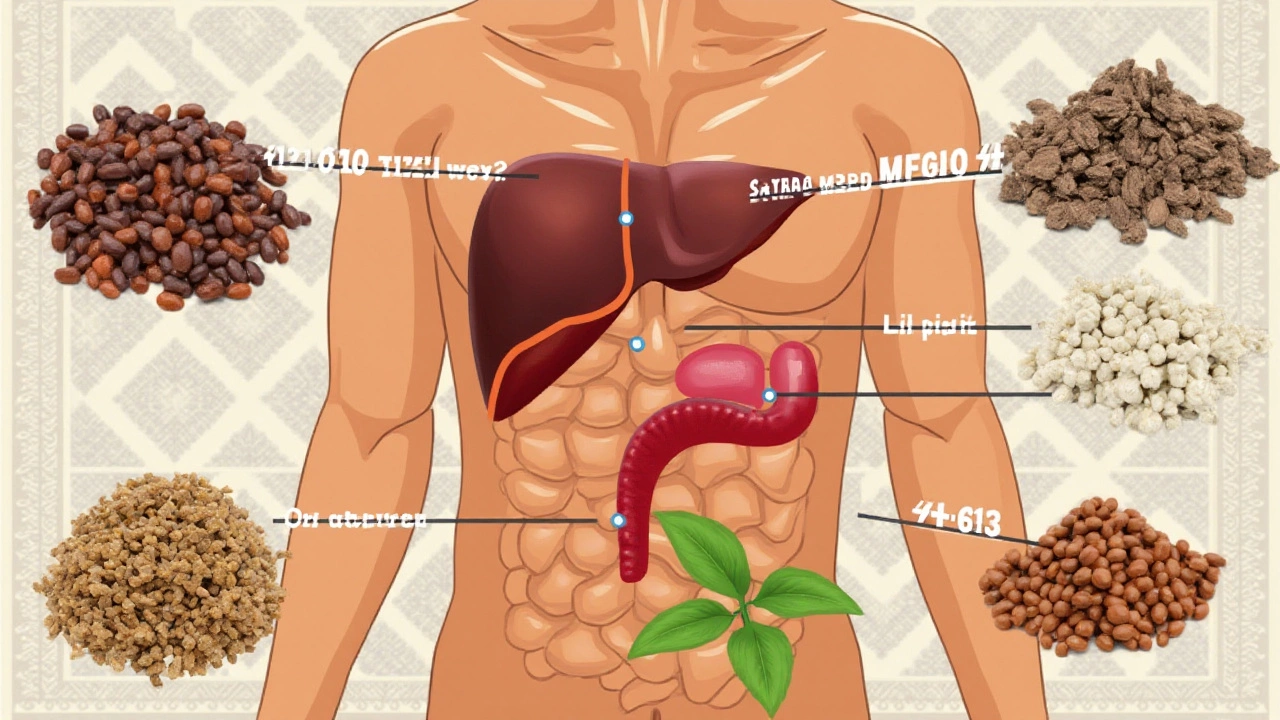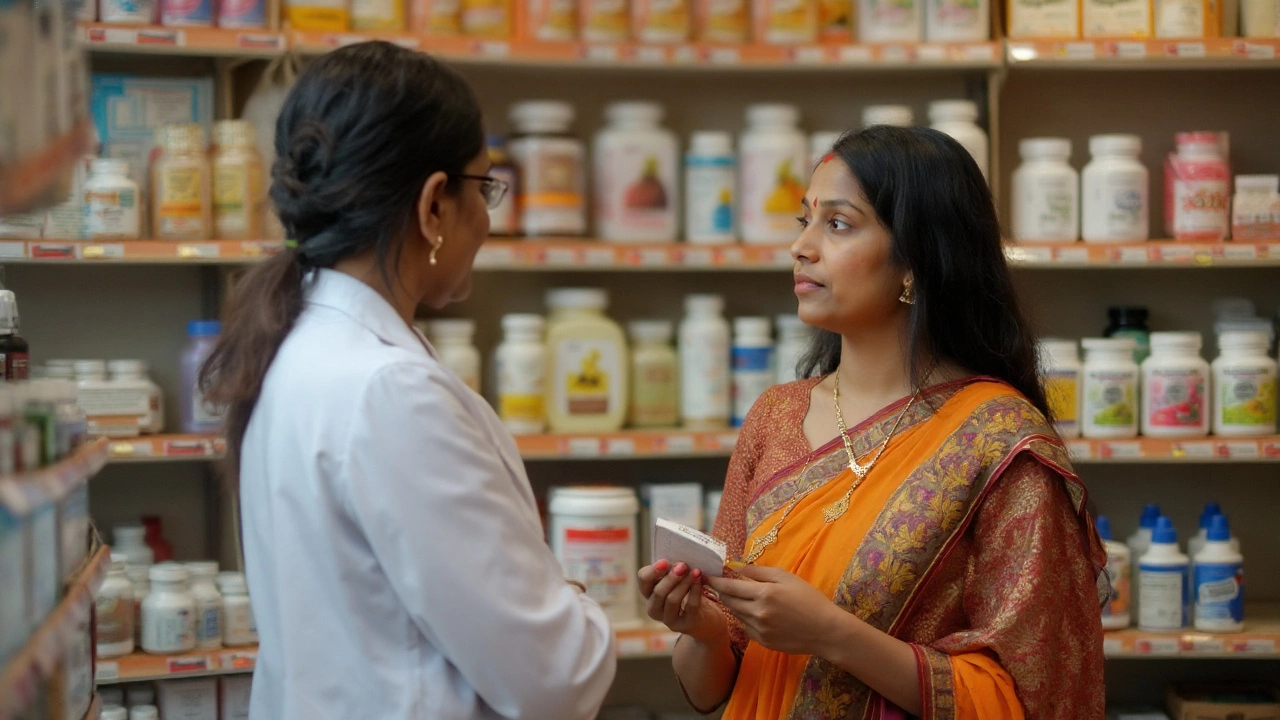
Herbal supplements are often seen as a natural alternative to pharmaceuticals, with many people turning to them for a boost in health or remedy for ailments. Their increasing popularity might give an impression that they are entirely safe. However, it's crucial to remember that 'natural' doesn't always mean risk-free.
While herbs have been used in traditional medicine for centuries, some of them might have adverse effects on liver health. The liver, a vital organ responsible for detoxifying the body, can be particularly vulnerable if certain herbs are consumed excessively or incorrectly.
In this article, we delve into the relationship between herbal supplements and liver function. By highlighting particular herbs associated with liver toxicity and providing tips for safe consumption, readers will gain a better understanding of how to approach herbal supplements wisely.
- Understanding Herbal Supplements
- Herbs Linked to Liver Toxicity
- Safe Consumption Practices
- Tips for Choosing Quality Herbs
Understanding Herbal Supplements
Herbal supplements have climbed to the top of alternative medicine charts, with their roots deeply embedded in history and culture. From ancient Chinese medicine to Ayurveda, plants have been lauded for their healing properties. Yet, for anyone delving into this world, it becomes evident that these natural wonders are as complex as they are fascinating. The buzz around herbal supplements is not just hype; they offer an impressive array of benefits, complementing modern healthcare by addressing specific deficiencies, offering anti-inflammatory effects, and even enhancing liver function. Yet, the vastness of information can be overwhelming, often standing at the intersection of folklore and science.
As the consumption of these remedies rises, it’s crucial to look into why they work. Active compounds, such as alkaloids and glycosides, make these plants powerful. However, this potency brings its own challenges. Consider St. John's Wort, celebrated for alleviating depression but known to interfere with pharmaceuticals. While natural remedies might seem harmless, the combination of various compounds can interact unpredictably with medications and body chemistry. An intriguing example is the rise in kava root usage, touted for easing anxiety, yet linked to serious liver issues. A study by the University of Maryland pointed out that kava, though popular, might be responsible for hepatotoxicity, stressing the meticulous nature in which herbal supplements ought to be approached.
Understanding these plants requires a blend of respect and caution. While the benefits of ginkgo biloba and turmeric are supported by promising research, one cannot ignore the gaps in regulation. The U.S. FDA doesn't regulate these products as strictly as pharmaceuticals, which sometimes results in variations in standardization, purity, and dosage. A 2016 survey showed nearly 60% of herbal supplements did not contain the plant material promised on the label, underscoring the necessity for consumers to exercise discernment. It's like the wild west of wellness, where informed self-education becomes the trusty sidekick. Dr. Andrew Weil, a respected figure in integrative medicine, once said,
"Herbs are like medicine in nature's package, illustrating that respect and educated doses can harness the best of their benefits."But, always remember, expert guidance remains paramount when integrating them into health regimes.
When handled wisely, natural remedies can be an excellent addition to a healthy lifestyle. Yet, it’s vital to acknowledge the vastness and unpredictability enclosed in these earthy confines. The key lies in understanding their rich complexities and the responsible paths towards incorporation. With blessings of nature and wisdom of science, herbal supplements can be both allies and advisors in the journey to wellness—when their secrets are respectfully unlocked.

Herbs Linked to Liver Toxicity
Herbal supplements have long been considered beneficial additives to our daily health regimen, yet not all herbs are entirely innocent when it comes to liver health. The liver is adept at filtering substances and toxins from the bloodstream, but certain herbs can introduce compounds the liver struggles to process, which may lead to liver damage. One of the most notorious herbs linked to liver toxicity is kava, often used to alleviate anxiety and promote relaxation. Despite its calming effects, kava contains substances called kavalactones, which have been found potentially detrimental to liver cells.
Another herb worth mentioning is comfrey, commonly used externally for healing bruises and sprains due to its soothing properties. However, internal use can pose significant risks. It contains pyrrolizidine alkaloids, which can lead to severe liver damage with prolonged intake. Many countries have regulated its use, illustrating the balancing act required when integrating powerful natural supplements into health routines. Liver health should be prioritized, ensuring such substances are consumed cautiously and under supervision.
It’s important not to overlook the potential impact of green tea extract, appreciated for antioxidant benefits and weight loss support. While moderate consumption in beverage form is generally safe, concentrated extracts increase the risk of liver damage in susceptible individuals. The liver metabolizes catechins found in green tea, and excessive concentrations can overwhelm its capacity, leading to oxidative stress and injury.
Experts have also raised concerns over black cohosh, an herb traditionally used to alleviate menopausal symptoms. Though effective for many women, there have been reports linking its use to liver inflammation. Documented cases emphasize the need for considering personal health history before adding this herb to one's regimen. As the popularity of herbal supplements continues, it's vital to recognize that liver reactions can arise and may require medical consultation.
Dr. John Smith, a hepatologist at the National Liver Foundation, once stated: "While herbal products might appear benign, factors such as dosage, duration, and individual liver health contribute significantly to their safety. Recognizing potential hazards is key to leveraging their benefits without enduring the risks."
These examples punctuate the necessity of careful research and measured approaches when incorporating herb-based remedies. Labels and instructions are there for a reason, guiding safe application and ensuring benefits are maximized while avoiding unintentional harm. By understanding the possible implications and choosing trusted sources, integrating herbs can be part of a healthy lifestyle, one that respects the delicate balance of bodily systems.

Safe Consumption Practices
Understanding the safe use of herbal supplements is pivotal for maintaining good liver health while reaping the benefits these natural remedies offer. First and foremost, it’s essential to introduce new herbs cautiously. Start by taking small dosages and observe how your body reacts. Remember, everyone's biology is unique, and what works for one individual may not work for another. Before adding a supplement to your routine, consulting with a healthcare professional, such as a doctor or registered herbalist, can prevent potential adverse reactions, especially if you have pre-existing liver conditions.
Pay attention to the source of your herbal products. Reliable brands tend to have rigorous testing for purity and potency, minimizing the risk of contamination with harmful substances. Also, avoid supplements with proprietary blends, as these often don’t disclose the exact quantity of each herb, complicating the process of identifying potential allergens or irritants.
According to the American Liver Foundation, “Around 20% to 30% of liver damage in the US is linked to herbal and dietary supplements.” This statistic highlights the need for caution and educated choices when selecting herbal products.
It’s advisable to adhere strictly to the recommended dosages provided on product labels or prescribed by a healthcare professional. Taking larger amounts in the hope of quicker results can lead to unintended consequences, including liver damage. Additionally, being aware of any regulations, warnings, or recalls on specific herbals is critical, as this information helps identify any potential liver-toxic products. Modern technology has made it convenient to check these through reputable health organization websites.
Watch for Symptoms
When using herbal supplements, observe for early signs of liver stress, such as jaundice, fatigue, abdominal pain, or unusual bruising or bleeding. Catching these symptoms early on allows for timely medical attention, which can make a significant difference in recoverability. Implementing a system to document the herbs you’re taking and any reactions can assist healthcare providers in understanding your situation fully, making it a useful habit for anyone who regularly uses supplements.
Keeping a healthy lifestyle, including a balanced diet rich in liver-friendly foods like leafy greens, nuts, and fatty fish, can also support your liver. Regular exercise further aids in maintaining optimal liver function. Together, these habits promote the liver's ability to process herbal supplements more efficiently, reducing the risk of liver toxicity.
Check for Interactions
Particular care should be taken if you are consuming other medications, as some herbs might interact with drugs, potentially altering their effectiveness or causing harmful effects. For instance, herbs like St. John’s Wort are known to reduce the efficacy of certain pharmaceuticals by accelerating the liver's breakdown of drugs. Balancing supplements and medications is a task best done with the guidance of a knowledgeable professional, ensuring a beneficial synergy without compromising health.

Tips for Choosing Quality Herbs
When it comes to choosing herbal supplements, the quality of your choice can greatly impact your health outcomes. It's important to recognize that not all herbal products are created equal, and doing some homework can save you from potential health hazards. The market is flooded with countless options, each boasting unique benefits. However, without proper knowledge, one may inadvertently consume inferior or even harmful products.
Firstly, sourcing is key. Knowing where your herbs come from can provide insight into their quality. Herbs grown in contaminated environments can carry toxins that could put your liver health at risk. It's wise to look for herbs sourced from reputable growers and certified organic whenever possible. Certification from recognized bodies ensures the herbs haven't been exposed to harmful chemicals. It's interesting to note that a high-quality herb maintains its color, aroma, and essential oils, which are indicators of its potency.
Another tip is to check the manufacturing standards the product complies with. Many countries, including the U.S., have guidelines for good manufacturing practices (GMP) that ensure products are produced in a quality-controlled environment. Checking for GMP certification on the packaging can be a good indicator of product reliability. Speaking of certifications, you might want to consider products verified by independent third-party organizations like ConsumerLab or NSF International, which conduct unbiased testing.
Reading the label is just as important. Comprehensive labels that disclose ingredients, recommended dosages, and warnings are often a good sign of transparency. Beware of ambiguous labels or those making exaggerated claims. It might also help to research any specific ingredient that raises questions, particularly if it's unfamiliar.
According to the National Center for Complementary and Integrative Health, 'While herbs can support health and wellness, the potential for interaction with other medications should not be overlooked.'This quote underlines the necessity of understanding what you're consuming.
Lastly, a good practice is to consult with healthcare professionals before starting any new supplement, especially if you have pre-existing conditions or you're on medication. Professionals can provide tailored advice, ensuring the chosen herb complements your health needs without negative effects on your liver or other organs. Combining personal research with professional guidance is often the best approach to ensure safe and effective use of herbal supplements.
Categories
Popular Articles

Apr 12 2025

Mar 29 2025






